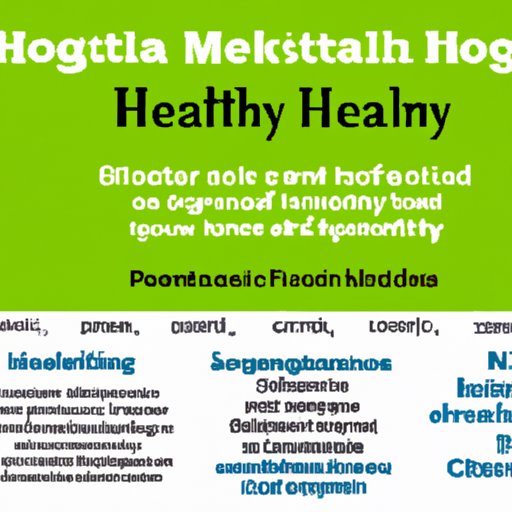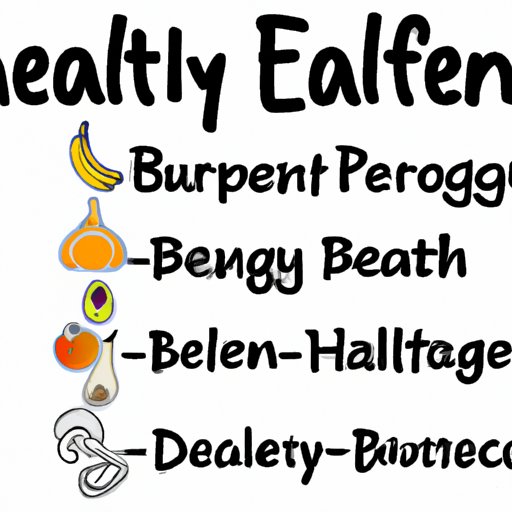Introduction
Eating healthy is a key component of living a balanced lifestyle and is essential for achieving optimal health. Healthy eating includes consuming nutrient-rich foods in the right quantities and with the right frequency. It also involves limiting processed foods, sugary snacks, and unhealthy fats.
This article will explore why it is important to eat healthy and how to do so. We will look at the link between good nutrition and physical health, the impact of healthy eating habits on mental health, and the connection between diet and chronic diseases. We will also discuss the benefits of eating a balanced diet and teaching children about healthy eating.

Link Between Good Nutrition and Physical Health
Good nutrition is essential for maintaining physical health. All of our body’s systems require certain nutrients to function properly and stay healthy. Vitamins, minerals, protein, carbohydrates, and fats are all necessary for our bodies to stay strong and healthy.
A diet that is rich in these nutrients can help us meet our daily needs and provide the energy we need to get through the day. Eating a balanced diet can also boost our immune system, which helps protect us from illnesses and infections.
Benefits of Eating Healthy
In addition to providing the nutrients our bodies need, eating healthy offers many other benefits. According to a study published in the Journal of the American College of Nutrition, “Nutrition plays a fundamental role in preventing and treating many chronic diseases such as obesity, cardiovascular disease, hypertension, diabetes, cancer, and osteoporosis.” Eating a healthy diet can help reduce the risk of these chronic diseases and promote overall health and wellbeing.
A healthy diet can also help maintain a healthy weight, improve energy levels, and support brain function. Eating nutritious foods can also help improve skin health, strengthen bones, and reduce the risk of developing certain types of cancer.

Impact of Healthy Eating Habits on Mental Health
The benefits of eating healthy don’t just stop at physical health—it can also have a positive impact on mental health. Studies have found that what we eat can affect our mood and mental wellbeing. Eating a balanced diet can help improve concentration, reduce stress, and even improve sleep quality.
According to a study published in the American Journal of Psychiatry, “Dietary patterns that are high in fruits, vegetables, whole grains, fish, and poultry and low in red and processed meats, sugar-sweetened beverages, and refined grains have been associated with improved mental health outcomes.” Eating a diet rich in these foods can help boost mood, reduce stress, and improve overall mental wellbeing.
Connection Between Diet and Chronic Diseases
Unhealthy diets can increase the risk of developing chronic conditions such as heart disease, diabetes, and stroke. Eating too much saturated fat, processed foods, and sugar can lead to obesity and increase the risk of developing these chronic diseases.
On the other hand, eating a healthy diet can help reduce the risk of developing these conditions. A study published in the American Journal of Clinical Nutrition found that “a healthy dietary pattern, rich in fruits, vegetables, legumes, whole grains, nuts, and fish, was associated with a lower risk of cardiovascular disease, type 2 diabetes, and some cancers.” Eating a healthy diet can help reduce the risk of these chronic diseases.

Benefits of Eating a Balanced Diet
Eating a balanced diet is essential for good health. A balanced diet includes a variety of nutrient-rich foods from each food group, including fruits, vegetables, whole grains, dairy, lean proteins, and healthy fats. Eating a variety of foods can help ensure you are getting all the nutrients your body needs.
Nutrient-rich foods such as leafy greens, berries, fatty fish, and nuts are especially beneficial for health. These foods are high in vitamins, minerals, antioxidants, and healthy fats, which can help promote good health and reduce the risk of developing chronic diseases.
Teaching Children About Healthy Eating
It is important to teach children about healthy eating from a young age. Educating kids on nutrition can help them make healthier choices throughout their lives. Teaching kids about the importance of eating a balanced diet and the benefits of healthy eating can help them develop healthy eating habits early on.
It is also important to involve kids in meal planning and grocery shopping. Involving kids in the cooking process can help them learn more about nutrition and healthy eating. Additionally, setting a good example by eating healthy yourself can encourage kids to make healthy choices.
Conclusion
Eating healthy is an important part of maintaining good health and can help reduce the risk of developing chronic diseases. Eating a balanced diet that is rich in fruits, vegetables, whole grains, and lean proteins can provide the nutrients our bodies need and offer many health benefits. Additionally, teaching children about nutrition from a young age can help them develop healthy habits that will last a lifetime.
Making healthy eating choices is an important part of living a healthy lifestyle. Eating healthy can help maintain physical and mental health, reduce the risk of chronic diseases, and promote overall wellbeing.
(Note: Is this article not meeting your expectations? Do you have knowledge or insights to share? Unlock new opportunities and expand your reach by joining our authors team. Click Registration to join us and share your expertise with our readers.)
